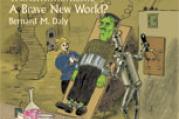Click here if you don’t see subscription options








Lincoln’s Virtues
One of the most enlightening and inspiring books I have read recently is William Lee Miller’s Lincoln’s Virtues: An Ethical Biography (Vintage, 2002). It is scholarly but very readable and of great relevance to the current political scene, especially for citizens who are deeply committed to moving their moral values into public policy and law.
Our greatest president, Miller makes clear, was ethically opposed to the institution of slavery throughout his life. Drawing on the language of the Declaration of Independence, he repeatedly affirmed that all men (all persons, we would now say) are created equal. That included Africans reduced to slavery in the home of the brave and the land of the free. He found the institution of slavery morally abhorrent. He said more than once that if slavery is not wrong, then nothing is wrong.
And yet he recognized that the Constitution permitted slavery and that it had existed legally as the backbone of the Southern economy for generations. He even acknowledged that had he been born a Southerner he might have become a slave-owner himself. The moral difference between the Northern abolitionist and the Southern plantation owner, Lincoln surmised, could be construed as at least partly an accident of birth and history. He never lorded it over his fellow citizens who happened to be on the wrong side of the slavery issue and he tended to think that full-bore abolitionists were long on moral righteousness but short on political wisdom and therefore ineffective in advancing their cause.
Thus, while adamant that slavery not be extended into any new territories or states, Lincoln nonetheless diverged from the abolitionist agenda regarding the longtime slave-owning South. He even supported, however reluctantly, the Fugitive Slave Act, which required that escaped slaves captured in the North be returned to their owners. The Great Emancipator was, in other words, also the Great Compromiser. He stood his ground on the moral principle but was realistic about what was possible in the public arena. He understood that moral absolutes such as all men are created equal do not always translate smoothly into public policy. He counted on Southern slavery to wither away of its own internal contradictions.
Some Catholic commentators today try to portray the current complex political situation relative to abortion in the same light in which President Lincoln viewed the issue of slavery. But they are often rebuked for doing so by fellow Catholics with the same single-minded moral righteousness with which Lincoln was rebuked by absolutist abolitionists in his own day. No doubt he was slandered with accusations of pro-slavery drivel and lies by people who were not his equal in any way, as was a colleague of mine recently who dared to suggest that deciding how to vote in this presidential election might be a matter of some agony for consistent-ethic Catholics.
Neither of our major presidential candidates today gives evidence of anything like the moral character or political wisdom of Abraham Lincoln. When so many lives are at stake in so many arenas of our national and global communities, fractured as they are in so many ways, the wise might consider that lack of great moral and political leadership an occasion for some agonizing. That was my colleague’s point.
Just as I honor President Lincoln for his understanding of the sometimes tortured relationship between morality and politics, I admire those who try to elucidate a complex political situation in our own day. That they sometimes do so with deep moral concern is perhaps evident only to those who can also appreciate Lincoln’s virtues.
Roger Bergman


